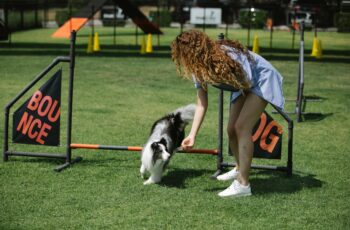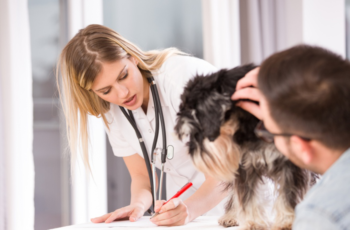You’re sitting down for a delicious meal, and your furry friend is giving you those irresistible puppy eyes. Can you toss puppers a pea from your plate? It’s important to know what human foods are safe for our canine companions, as their digestive systems and nutritional needs differ from ours.
Yes, dogs can eat peas. Although peas contain fiber, which can aid in digestion, it’s important to remember that dogs have shorter digestive tracts compared to humans. Therefore, the fiber content in peas may not have the same impact on their digestive system as it does on ours.
Before you toss some peas into your dog’s bowl, let’s dig deeper into the topic and understand whether peas are a suitable addition to their diet.
The Nutritional Value of Peas
Before we dive into whether dogs can have peas, let’s take a closer look at the nutritional value of these tiny green vegetables. Peas are packed with vitamins and minerals that can be beneficial for both humans and dogs. They are an excellent source of fiber, which aids in digestion and can help regulate your dog’s bowel movements. Peas also contain essential vitamins like vitamin K, vitamin C, and vitamin B6. Additionally, they are rich in antioxidants that can support your dog’s overall health and immune system.
While dogs do require certain vitamins and minerals in their diet, their nutritional needs differ from ours. It’s important to note that although peas offer some nutritional benefits, they should not be a substitute for a well-balanced dog food diet. Your dog’s primary source of nutrition should come from a high-quality commercial dog food that meets their specific dietary requirements.
Now that we understand the nutritional value of peas, let’s discuss the potential benefits of peas for our furry friends.

Potential Benefits of Peas for Dogs
While peas may not be an essential part of your dog’s diet, they can still offer some potential benefits when fed in moderation. One notable benefit is their low-calorie content. If your dog needs to shed a few pounds or maintain a healthy weight, incorporating peas into their meals can help fill them up without packing on extra calories.
Peas are also a source of plant-based protein, which can be beneficial for dogs with certain dietary restrictions or allergies. However, it’s important to note that dogs primarily require animal protein, so peas should not replace high-quality meat in their diet.
Another potential benefit of peas is their antioxidant properties. Antioxidants help protect the body against free radicals, which can contribute to cellular damage. While dogs naturally produce some antioxidants, incorporating foods like peas into their diet can provide an additional boost of these beneficial compounds.
The Safety of Peas for Dogs
In general, peas are safe for dogs to eat in moderation. They are even included as an ingredient in many commercial dog foods due to their nutritional benefits. However, there are a few precautions to keep in mind when feeding peas to your pup.
It’s essential to cook peas thoroughly before offering them to your dog. Raw peas can be challenging for dogs to digest and may cause digestive upset. Cooked peas, on the other hand, are easier for dogs to chew and digest, making them a safer option.
You should always introduce peas to your dog’s diet gradually. Just like with any new food, some dogs may have an adverse reaction to peas. Start by offering a small amount of cooked peas and monitor your dog for any signs of digestive issues or allergies. If your dog shows any negative symptoms, such as vomiting or diarrhea, discontinue feeding peas and consult your veterinarian.
See also

Lastly, be mindful of portion sizes. While peas can be a healthy addition to your dog’s diet, they should be given in moderation. Peas can provide nutritional benefits, but they should be incorporated into your dog’s diet as a treat or occasional addition, rather than a staple food. Feeding your dog excessive amounts of peas could lead to an imbalance in their diet and potentially cause digestive issues.

Serving Peas to Your Dog
Now that we’ve established that peas can be safe for dogs in moderation, let’s discuss how to serve them to your furry friend. Cooked peas can be a tasty and nutritious addition to your dog’s meal. Here are a few ideas:
You can mix a small amount of cooked peas into your dog’s regular food to add some variety and extra nutrients. Be sure to chop the peas into small, manageable pieces to make it easier for your dog to eat. You can also use peas as a training treat or a healthy snack. Simply cook a batch of peas, let them cool, and offer them as a reward during your training sessions or as a standalone treat throughout the day.
Remember, just like with any new food, it’s always a good idea to consult with your veterinarian before introducing peas or any other human food into your dog’s diet. They can provide personalized advice based on your dog’s specific needs and dietary restrictions.
Conclusion
So, can dogs have peas? The answer is yes, in moderation, when cooked properly, and as part of a balanced diet. Peas can offer some nutritional benefits, but they should not replace the primary components of your dog’s diet, such as high-quality dog food or meat. It’s important to cook or steam peas before feeding them to your dog and to be mindful of any potential allergic reactions or digestive issues. Peas can be a tasty and nutritious treat, but as always, consult with your veterinarian before making any significant changes to your dog’s diet. Now, go ahead and share a few peas with your furry friend while enjoying your next meal!


